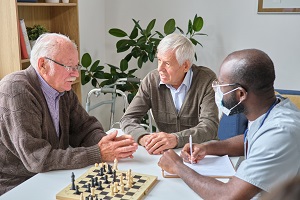The Dementia Training Requirements for Assisted Living Facilities course will teach healthcare providers (HCP) on how to care for patients with dementia.
Dementia refers to general decreases in cognitive and perceptual abilities, to the point where it significantly impacts a person’s daily functioning. The most common form of dementia is Alzheimer’s disease.
Around 5.8 million adults aged 65 or older were living with dementia in 2019. By 2060, there is predicted to be around 14 million adults suffering from dementia.
What You’ll Learn
- Overview of dementia
- Signs and symptoms of dementia
- Different types of dementia
- How to identify and treat dementia
Details
Course length: 30 minutes; CEU: 0.5.
Languages: American English
Key features: Audio narration, learning activity, and post-assessment
ACCME Accreditation
American Medical Compliance is accredited by the Accreditation Council for Continuing Medical Education (ACCME) to provide continuing medical education to physicians. Our Continuing Medical Education (CME) program is committed to enhancing the knowledge, skills, and professional performance of healthcare providers to improve patient care outcomes. Through high-quality educational activities, we aim to address the identified educational gaps and to support the continuous professional development of our medical community. American Medical Compliance designates this activity for a maximum of 0.5 AMA PRA Category 1 Credits. Physicians should only claim this credit for their complete participation in this activity.
Get Certified
American Medical Compliance (AMC) is a leader in the industry for compliance, Billing, and HR solutions. To become certified, please visit us at American Medical Compliance (AMC).
Reach out for other courses by visiting the AMC Course Library.
Causes of Dementia
Damage to brain cells can cause dementia. When damage occurs, the brain has trouble communicating with itself. If brain cells don’t interact with each other in a functional way, cognitive and behavioral processes can be negatively affected.
There are other factors that can influence brain health. These include depression, vitamin deficiencies, and thyroid problems. For more information on the causes of dementia, please refer to this training.
Dementia and the Brain
During natural aging, the brain shrinks, but it still maintains a sufficient level of neurons. However, the damage related to dementia can lead to decreased neural functioning and connections. Dementia disrupts neural networks which can lead to changes in communication and digestion. Dementia begins by killing neurons near the brain areas responsible for memory including the hippocampus. However, it can spread to other regions such as the cerebral cortex, which can affect thought and language. This causes a person with dementia to lose functioning continuously over a period of time. Dementia can have severe effects on different parts of the brain. The main sections of the brain affected by dementia are the frontal, parietal, and occipital lobes. This training provides greater details on dementia and the brain.
Signs of Dementia
There are several different signs of dementia. Here are a few of them:
Individuals with dementia may start getting lost in familiar areas. They also might use unusual words to refer to common objects. It is typical for someone with dementia to forget the name of a close friend or family member. Memories may be forgotten as well.
Additionally, there are several noticeable symptoms of dementia. For example, a dementia diagnosis indicates memory loss or degradation of cognitive skills.
The signs of dementia are different for each individual. However, it is very common for patients to report memory, attention, and communication issues. Learn more about the signs of dementia by taking this training.
Classifications of Dementia
Dementia is typically classified into different categories. One commonly known category is Alzheimer’s disease.
Alzheimer’s disease is the most widespread cause of dementia, affecting between 60 and 80% of patients. Alzheimer’s is caused by changes within the brain. The most common symptom of Alzheimer’s is having trouble recalling recent events.
Diagnosing Dementia
Healthcare providers can use testing measures to diagnose dementia. These tests will assess attention, memory, and cognitive abilities such as problem-solving. For example, the Mini-Mental State Exam (MMSE) is a common memory test. The type of treatment provided depends on the underlying cause. Many dementia-related conditions do not have a cure. However, there are medications that patients can take to help protect the brain and manage symptoms.
Several healthy lifestyle factors can help patients decrease their chances of developing chronic diseases. These include regular exercise, healthy eating, and maintaining social connections. This will also help to reduce the actual number of dementia patients.
Risk of Dementia
There are several risk factors for dementia, including age, race, and family history. However, adopting healthy behaviors can help to prevent the development of dementia. Age is the strongest risk factor for dementia, as it mostly affects those aged 65 and older. Also, people who have family members with dementia are more likely to develop the condition as well.
Race and ethnicity is another risk factor. Dementia is more common among African Americans and Hispanics. This training gives more detailed information on dementia risk factors.
Reducing Risk
There are several approaches one can take to prevent dementia. Firstly, individuals should avoid smoking. Lower rates of smoking are associated with improved brain health and heart function.
Additionally, blood pressure is crucial in preventing dementia. High blood pressure can cause other health conditions.
Cholesterol levels should also be regularly managed. Individuals can manage cholesterol through proper exercise and medication.
Patient Care
The quality of life for people suffering from dementia depends on the nature of their relationships with caregivers. Each person with dementia faces unique needs and challenges. Effective dementia care involves developing a treatment based on specific patient needs and coming up with unique solutions for challenging problems. The care environment should promote healthy communication and relationships among all stakeholders. Staff should remain vigilant in supporting residents fully.
Person-Centered Care
This training provides several recommendations for providing treatment to dementia patients. All individuals should be treated with dignity and respect. All individuals have unique backgrounds and lifestyles that need to be considered when creating treatment plans.



